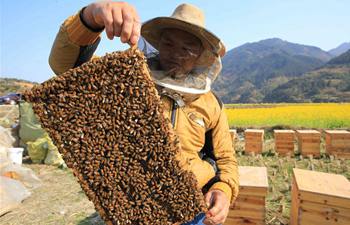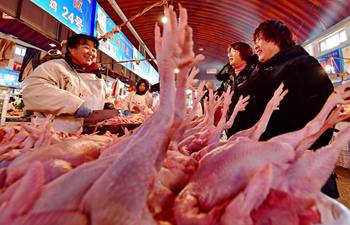GENEVA, Feb. 5 (Xinhua) -- A latest study published in the U.S. magazine Health Affairs has shown that by 2030 vaccines not only will have saved millions of lives around the globe, but also will help prevent 24 million people in some of the world's poorest countries from slipping into poverty.
The Harvard study, co-authored by the Vaccine Alliance (Gavi), and a wide range of partners, modeled the health and economic impact of vaccines for ten diseases in 41 developing countries. It estimated that vaccines administered between 2016 and 2030 would prevent 36 million deaths.
Sudden health care expenses push about 150 million people into poverty every year, making medical impoverishment one of the main factors forcing families below the World Bank's poverty line of less than 1.9 U.S. dollars per day, according to the study.
"Vaccines don't just save lives, they also have a huge economic impact on families, communities and economies," said Gavi CEO Dr. Seth Berkley.
Statistics show that vaccines will have the greatest impact on reducing cases of poverty caused by hepatitis B, helping an estimated 14 million people avoid medical impoverishment. Cases of poverty caused by measles and meningitis A will also be significantly reduced by vaccines, with an estimated five million and three million cases averted respectively.
Meanwhile, measles vaccine is estimated to prevent by far the highest number of deaths, which is 22 million of the 36 million total.
The researchers concluded that the introduction of vaccines in the poorest regions will have the greatest impact on reducing both the number of deaths and the number of people forced into poverty by the cost of health care.
The study underlines that sustained investments in vaccines could therefore make a large contribution toward achieving the UN Sustainable Development Goals and universal health coverage.
Earlier a 2016 study by Johns Hopkins University, also published in Health Affairs, found that for every one U.S. dollar spent on immunization, 16 dollars is saved in health care costs, lost wages and lost productivity due to illness. Taking into account the broader benefits of people living longer healthier lives, the return on investment rises to 44 dollars per one dollar spent.
"We now need to redouble our efforts to ensure every child, no matter where they're born, has access to lifesaving vaccines," said Berkley.

















